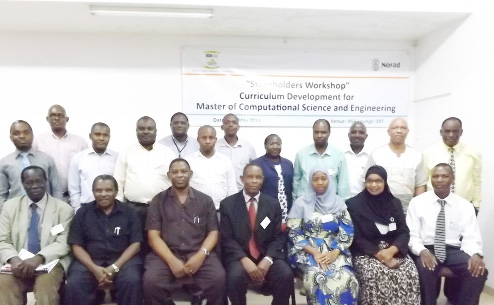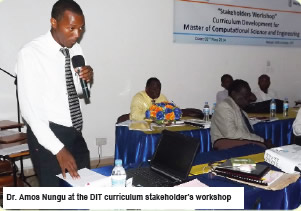Blog
New Masters curriculum to benefit Tanzanians
 Computational Science and Engineering (CSE) is a broad multidisciplinary scientific course that involves applications in science/engineering, applied mathematics, numerical analysis, and computer science. Computer models and computer simulations have become an important part of the research carrier, supplementing or replacing experimentation.
Computational Science and Engineering (CSE) is a broad multidisciplinary scientific course that involves applications in science/engineering, applied mathematics, numerical analysis, and computer science. Computer models and computer simulations have become an important part of the research carrier, supplementing or replacing experimentation.
Going from application area to Computational results requires domain expertise, mathematical modeling, numerical analysis, algorithm development, software implementation, program execution, analysis, validation and visualization of results.
The Computational Science and Engineering (CSE) involve all of these aspects. Computational Science and Engineering (CSE) is the fast growing area which address solutions of various problems in science and engineering domain. Basing on this fact the Dar-es-Salaam Institute of Technology (DIT), funded by the WIMEA-ICT conducted a needs survey to find out the need of establishing a Masters Degree programme in Computational Science and Engineering at DIT.
The programme that is expected to commence in October 2015 is rich and practical. In the situation analysis report (SAR), more than 95% of the consulted survey respondent stakeholders said this programme will provide quick and effective solutions to most socio-economic challenges in Tanzania and elsewhere.
The report recommended the structure of the academic program, mode of delivery and the competencies, which include general attributes, supervisory, technical, research and communication skills as they are preferred by the stakeholders.
In order to ensure that the proposed programme is demand-driven and accommodates the views and perspectives of different stakeholders, the DIT conducted a consultative stakeholders’ workshop to give an opportunity to different stakeholders to share their views and recommendations on it.
Four papers were presented during this stakeholders’ workshop. The first paper was a summary of Competence- Based Curriculum Development. The paper outlined the concept of competency in CBET, framework for curriculum development, CBET overview, curriculum development process, implementation strategies and approval structure. The second paper was a summary of the Situation Analysis Report for the establishment of Master in Computational Science and Engineering programme.
The presentation highlighted key issues such as the need for establishing the programme, reasons and objectives for conducting a situation analysis, the methodology used, key findings and conclusions. The third paper was about the proposed Masters in Computational Science and Engineering programme Curriculum Information Report.
It was explained that MCSE is a programme at NTA level 9 according to NACTE standards. The fourth paper explained the implementation strategies of the proposed programme. In this presentation, the programme delivery, human and physical resources were briefly presented. Finally, the stakeholders accepted the presented proposal for the establishment of Master in Computational Science and Engineering programme at DIT.
PROPOSED BENEFITS
 The purpose of this programme is to equip students and the Tanzanian society with current knowledge and best practices in Computational Science and Engineering that will be beneficial to the growth and sustainability of the Tanzanian economy.
The purpose of this programme is to equip students and the Tanzanian society with current knowledge and best practices in Computational Science and Engineering that will be beneficial to the growth and sustainability of the Tanzanian economy.
The study also revealed that the proposed training programme will produce skilled personnel in Computation Science and Engineering in areas such as weather and climate, health, commercial and economic activities, High Performance Computing, Oil and Gas, Energy, Research development, Petroleum and Mining sectors. This programme will as well directly or indirectly be useful to almost all development sectors inside and outside the country.
